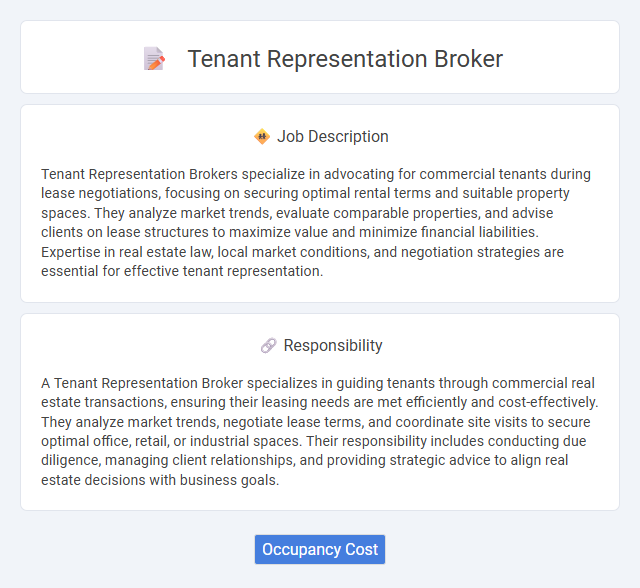
Tenant Representation Brokers specialize in advocating for commercial tenants during lease negotiations, focusing on securing optimal rental terms and suitable property spaces. They analyze market trends, evaluate comparable properties, and advise clients on lease structures to maximize value and minimize financial liabilities. Expertise in real estate law, local market conditions, and negotiation strategies are essential for effective tenant representation.
Individuals with strong communication skills and a high level of resilience are likely to be well-suited for a Tenant Representation Broker role, given the frequent client interactions and negotiation challenges. People who thrive in fast-paced environments and can manage stress effectively may find this job compatible with their temperament. Conversely, those who prefer routine tasks and low-pressure settings might struggle with the demands of tenant representation responsibilities.
Qualification
A Tenant Representation Broker must possess in-depth knowledge of commercial real estate markets, lease negotiations, and tenant needs analysis. Professional qualifications often include a valid real estate license, certifications such as Certified Tenant Representative (CTR), and experience in financial analysis and contract law. Strong communication, negotiation skills, and an understanding of zoning regulations are essential for effectively advocating on behalf of tenants.
Responsibility
A Tenant Representation Broker specializes in guiding tenants through commercial real estate transactions, ensuring their leasing needs are met efficiently and cost-effectively. They analyze market trends, negotiate lease terms, and coordinate site visits to secure optimal office, retail, or industrial spaces. Their responsibility includes conducting due diligence, managing client relationships, and providing strategic advice to align real estate decisions with business goals.
Benefit
Tenant Representation Brokers likely enhance a tenant's negotiating power by leveraging market expertise to secure optimal lease terms. They probably reduce risks and hidden costs by conducting thorough property and lease analyses tailored to client needs. Clients may experience significant time and cost savings through streamlined site selection and transaction management processes.
Challenge
Tenant representation brokers often face the challenge of balancing client needs with market availability, requiring keen negotiation skills and adaptability. They likely encounter complex lease agreements and shifting market conditions, demanding thorough knowledge and strategic thinking. Navigating competing interests and tight deadlines may frequently test their problem-solving abilities and resilience.
Career Advancement
A Tenant Representation Broker specializes in advocating for tenants in commercial lease negotiations, leveraging market analysis and property insights to secure optimal terms and locations. Career advancement often involves gaining deeper expertise in commercial real estate markets, expanding client networks, and mastering negotiation strategies. Progression can lead to roles such as Senior Broker, Team Leader, or Brokerage Firm Partner, with increased responsibility and commission potential.
Key Terms
Occupancy Cost
Tenant Representation Brokers specialize in optimizing occupancy costs by negotiating favorable lease terms and identifying cost-effective commercial spaces for tenants. They analyze market trends, operating expenses, and hidden fees to minimize total occupancy costs and improve the tenant's financial efficiency. Their expertise ensures tenants secure optimal rental rates, expense controls, and lease structures aligned with long-term budget goals.
 kuljobs.com
kuljobs.com